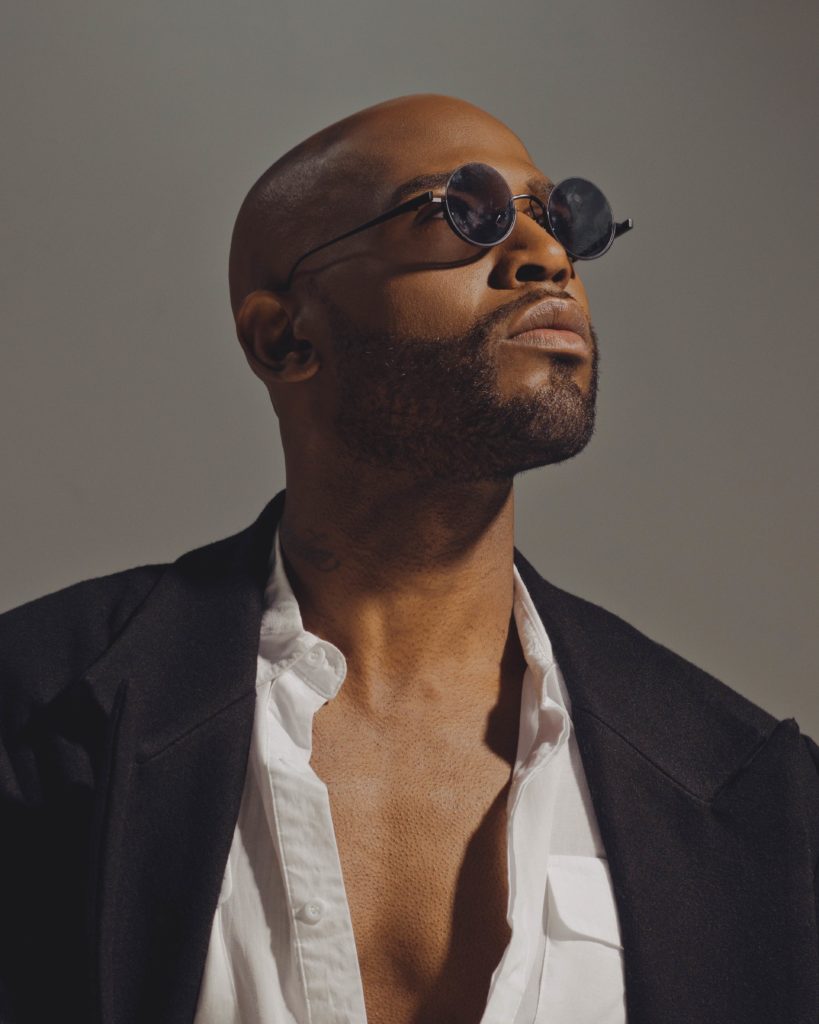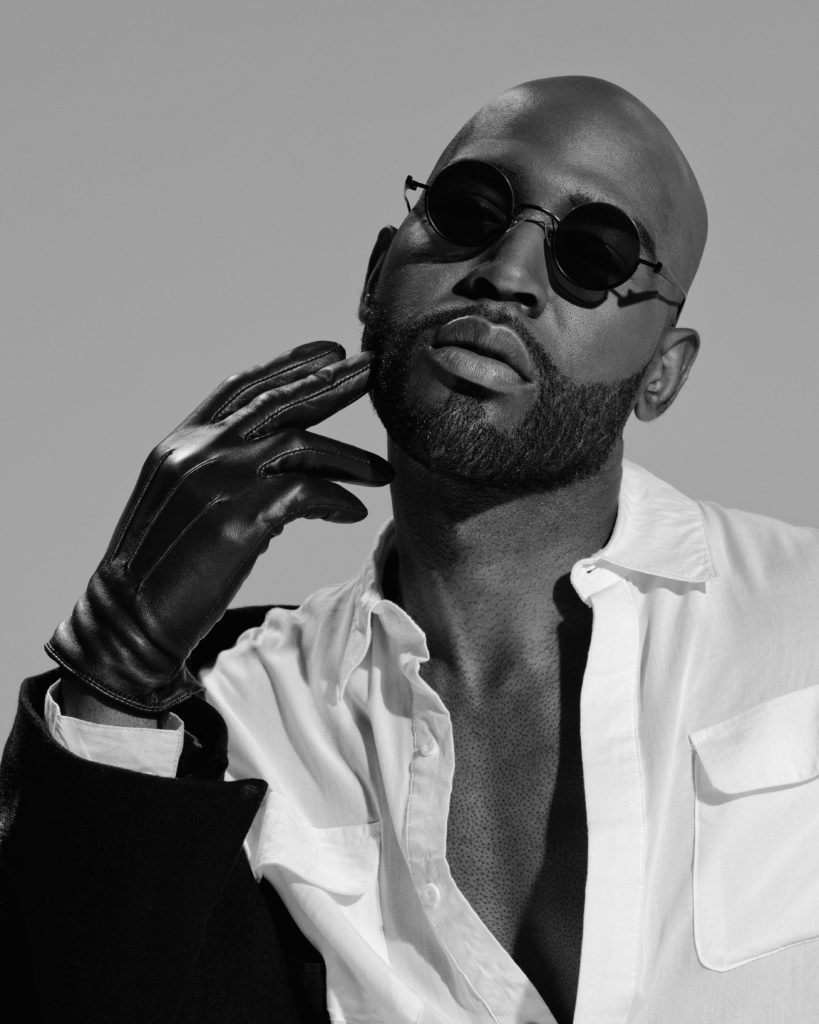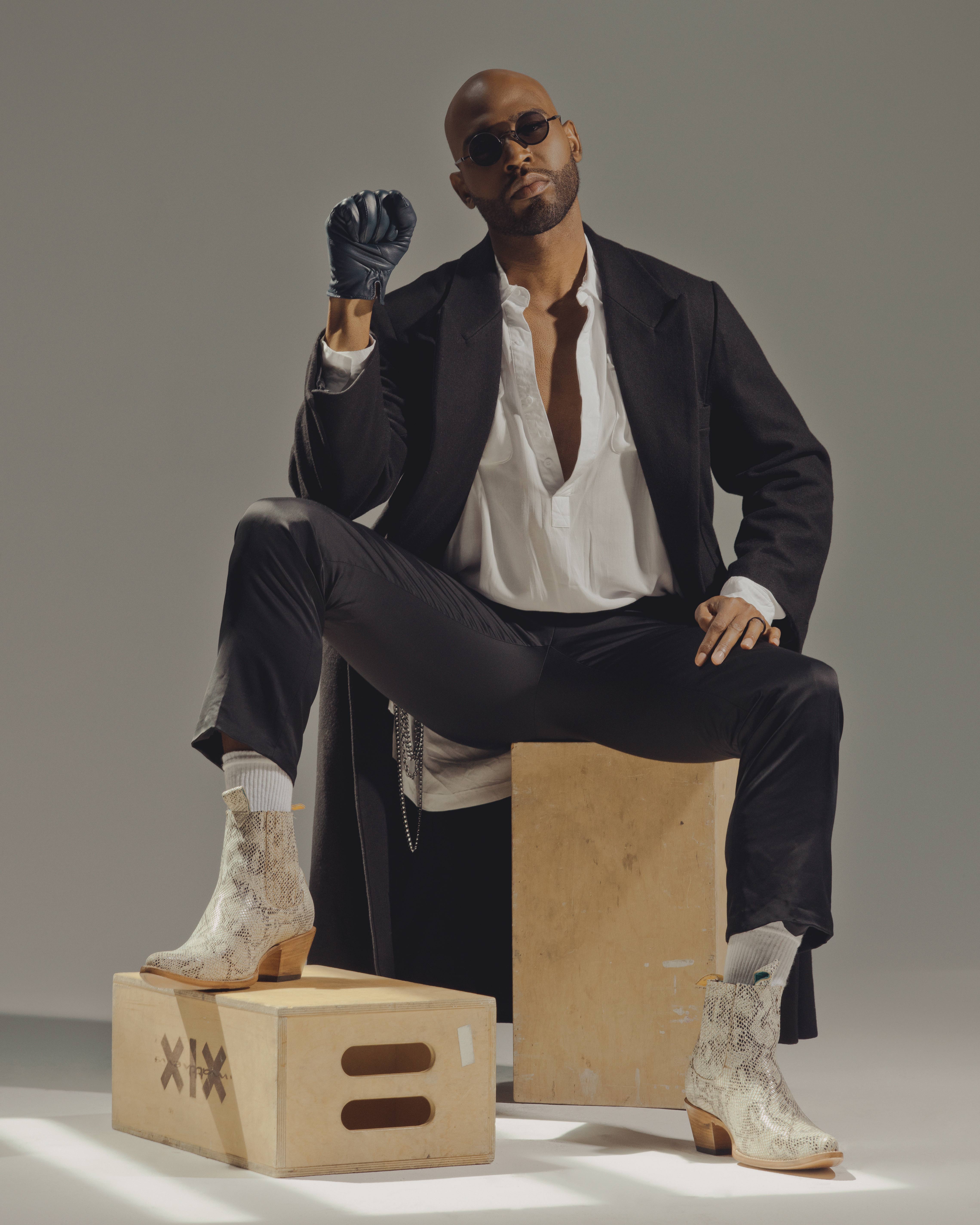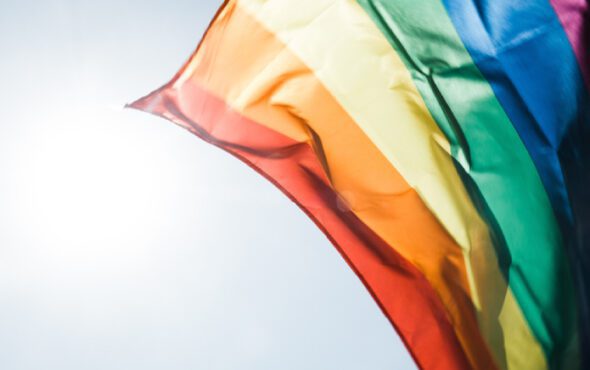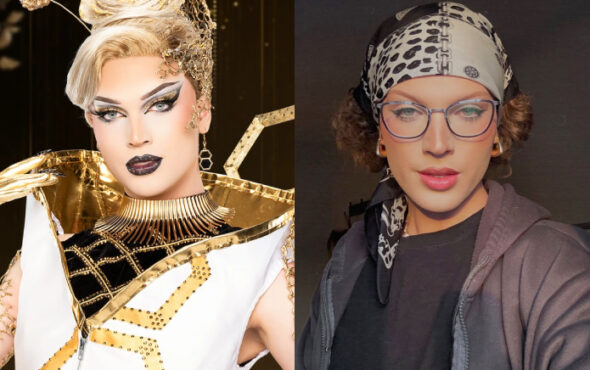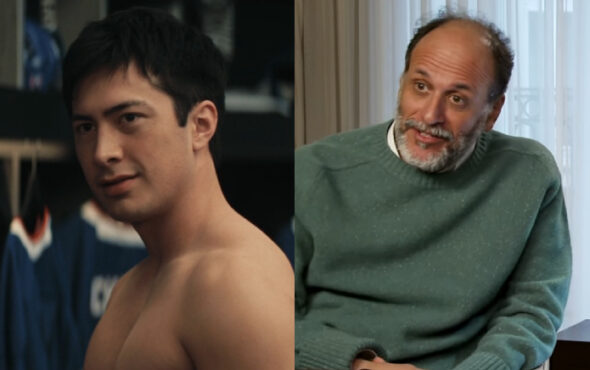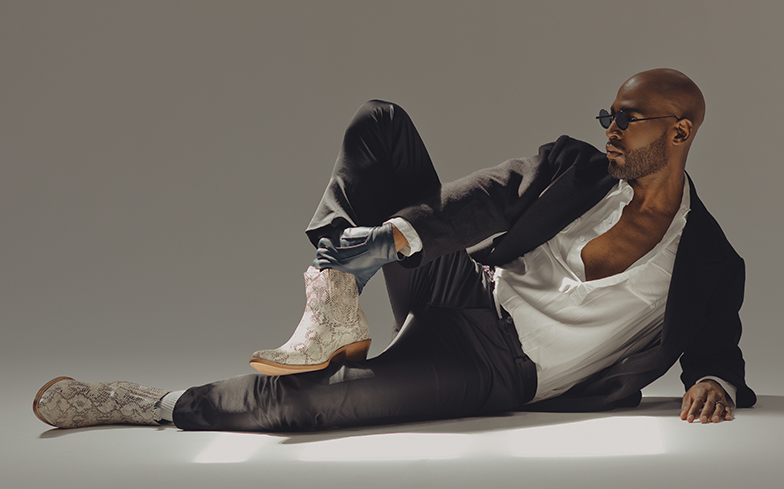
“I know so many of us suffer from mental health issues,” Karamo says speaking to the camera with conviction, in a video to his near 2 million strong Instagram audience.
“And we just don’t know where to turn. And every day seems darker and darker, but I want you to know that things do get better. If you get help and you do the work daily your life can change. I’m living proof.” When Karamo Brown speaks, one gets the uncanny sense that somewhere under the recesses of his impeccably chosen bombers and cinnamon grin, a seismometer is working itself off the charts; this is not to suggest his voice ever conveys anything less than a calm, confident surety, but rather in his collected, authoritative tone present throughout the time that we have to speak, the man is much more akin to a force of nature than anything else.
Karamo is after all one of the virtually worshipped Fab Five, stars of the hugely successful, recent Netflix reboot of Queer Eye — a team of lifestyle gurus tasked with makeovers that move beyond merely the fluff and gloss of the aesthetic, and into the realm of something more deeply and truly transformative. Whilst he was no stranger to the small screen spotlight having competed on multiple series of MTV’s Real World format, hosted their 2017 Love Island analogue ‘Are you the One?’ and a number of other television spots, the viral popularity of him and his fellow five have catapulted them to that uniquely and much sought after 21st century new-school fame — a kind of canonisation for the digital age — whilst simultaneously creating that peculiar familiarity that so often peels away any traditional partition between fan and star.
“It’s funny, of all the people who support us I don’t call them fans I call them ‘friends’ — [I feel like] we all can be friends we connect — when friends come up to me, I’m the one out of all the guys that we could be in the middle of a club, we could be in a post office, we could be anywhere and people tell me their life stories and cry on my shoulder. And I love it!” he enthuses. “The other guys are always like ‘I couldn’t deal with it…’ and I’m like, ‘No [it’s good], because a lot of the time people don’t feel like they have an outlet to talk’. So I don’t mind being their outlet.” Indeed, being madeover by the Fab Five borders on the numinous. We’ve seen love affairs mended and seemingly untraversable political divides crossed.
The idea of the one-hour reality TV show breakthrough arc might strike people as necessarily contrived, but a lot can be accomplished with sufficiently surgical precision and enough get-up- and-go. Listening to Karamo and seeing the post- show impact of Queer Eye on its subject’s outlooks, self-esteem and the full breadth of their lives lends an unquestionable measure of authenticity to their transformations. “A lot of people don’t understand how how hard it is to meet someone on a Tuesday and have to get to their emotional issue by Friday, so they can have a breakthrough,” he explains of the show’s week long journey.
That some Queer Eye fans all but recline onto a chaise longue when they see Karamo is completely empathisable; both on the show and in conversation, Karamo radiates an unmistakably soothing aura. The history of the world is inextricably bound up in our search for panacea, the next cure, for proven relief in as little time as possible. In times long past people often travelled far and wide in search of cures known only by word of mouth — but whereas these people often delved headfirst and unguaranteed into the distant and shamanic, millions have witnessed the proven efficacy of Karamo, a trained psychotherapist and experienced social worker with over a decade of practice under his belt, deal in his now infamously life-changing breakthroughs. “So for me,” he muses, “[I have an] understanding that my goal, one of my purposes in this world is to support people and to be able to help them to get to a place where they feel as if they can release the trauma, start healing. “But it’s also understanding,” he caveats about his own accessibility, “that I have a limit.” The self- care question is a big, important one.
“For me, as a Black man, but also as a gay man,” he continues, “there were certain boundaries that I felt like I had to be loose with so I could be liked. And I think we all are affected by that to some degree. Where we’re like ‘I know this is my boundary, but because I don’t want to stand out, or because I want to be liked, or because I want my family to accept me or because I fill in the blank, I’m going to let my boundaries slide.’ But for me, I’m very clear on my boundaries and I’m okay with them… And for me I can say to people: ‘Right now I want to support you, but I’m not able to’, so I appreciate you opening up, I acknowledge it, and let me give you some other resource of someone who can help. And that’s how I protect myself.” As someone constantly confronted with the trauma of others as well as his own, preventing burnout and protecting his own mental health is non-negotiable in Karamo’s role. Not just on Queer Eye, but in his wider mission, and Karamo is undoubtedly on one.
Karamo’s relationship with mental health, self- esteem and wellbeing advocacy has always long stretched beyond the one hour Netflix format. He recently took the radically bold step of discussing his suicide attempt of 12 years ago, to his millions of social media followers. “We need to get to a place where we feel very confident about talking about this,” he begins to explain when I ask why he thought it was important to share the experience. “Because the lack of discussion, and the lack of openness is what’s killing us.” Karamo’s point cannot be emphasised enough. In the United Kingdom, suicide is the single biggest killer of men aged under 45. The Office for National Statistics reported that 75% of all suicides in 2015 were committed by men, a tragic product of a lethal cocktail of toxic masculinity, stigma around poor mental health, and a culture of silence — all of which Karamo is fighting to transform.
“Me sharing my story is to save someone else,” he continues. “So that someone doesn’t feel like they’re lost, like they have to overdose, that they want to commit suicide, because I am a poster child… I’m a mental health professional, who lost his way. Anybody can lose their way. Because mental health is something you have to constantly work on and get support on. So if I can lose my way and feel like life is dark and there’s no importance of living, then I also can find my way. And I wanted people to know that they can find their way as well if they’re going through it.”
While the world at large might just be getting to know him, his dedication to solving mental health crises doesn’t end when the credits roll. As I’ve written previously, in a white supremacist, heteronormative society that visits violence upon queer bodies — those bodies that deviate from its own entrenched standard — the mental health of LGBTQ people is necessarily devastated. Recent studies show that Nearly 50% of trans people under the age of 26 have attempted suicide. Such are the effects of slurs and physical violence, and the profound effects denial of personhood, community and representation bear upon the mental health of queer people; it is the inability to envision a future without violence and rejection; a frustrated desire for space in which one’s life, loves, and body is a not a thing to be demeaned or ridiculed, but rather normalised, and even celebrated. For QTIPOC, the intersection of our marginalised identities, create a perfect storm of experiences that decline our mental health at a more precipitous rate than our white queer siblings. There are a multitude of ways in which queerphobia and racism compound and exacerbate each other in our experience of moving through through the world.
Black queer men are often victims of this double dislocation — alienated by racism within the LGBTQ community, and faced with the homophobia by black communities who view queerness as white/western deviance. They are critically overrepresented in HIV/AIDS statistics, and yet virtually invisible in awareness and prevention campaigns. It was in a response to widespread erasure, and faced with the apathy of larger society and our own fellow LGBTQ people, and a criminal lack of targeted resources that Karamo founded 6in10.org (now subsumed into the Black AIDS Project). It was a response to a growing crisis of new transmissions, of whom black gay and bi men were disproportionately represented in, and the impact of stigma on those already living with the disease.
“I’ve had too many friends be diagnosed,” he starts, “Many of them [go on to] live very happy lives, but then as many who aren’t able to get over [the low] self esteem and mental issues that come with being diagnosed, and eventually decide to stop seeking care.” Karamo finds it a travesty that in this day and age we are we still watching people pass away from something not only preventable, but importantly that with proper care is no obstacle to a long, happy and healthy life. His epiphany came in the wake of a cancelled American radio interview he was lined up to do.
“I wanted to talk about this epidemic, and they cancelled me, and I asked why and they said ‘Because we don’t care about this topic,’ and so my first thought was: Do you not care about Black people? Do you not care about people infected with HIV? Or do you not care about LGBTQ people? And either way I’m going to cuss your ass out!” he says, the bite audible in his voice. “And they got really uncomfortable and hung up the phone, and I started the organisation a day later.” For Karamo again, the work of their mental health team took centre stage: “[We wanted to positively] affect their mental health and their self esteem…it was all about how do we help you to see yourself in the best light possible, how do we help you to fight against the stigma whether you’re infected or affected by the disease — and I say affected because we’re all affected,” he explains. “If one us has been diagnosed, then we’ve all been diagnosed.”
He is aware of the privileged overrepresentation that cis gay men have within the black queer community, himself included, and is constantly working to open that door for our less represented siblings. “I like to strategically make sure that when I have contracts or opportunities that the people that are being hired are black LGBTQ people,” he tells me. “When I’m doing this, I want to make sure that I’m helping out [not just my] gay brothers, [but] my lesbian sisters, my bi sisters and brothers, my trans sisters and brothers! Part of the whole male privilege [is] that we’re not looking at being like ‘Yo! What about our sisters right here?’ They’re dope as fuck and they’re not getting opportunities!”
In spite of the heavy topics we’ve spent a lot of the phone call discussing, Karamo is still able to tap into lightness and a silliness that I find delightful. He kindly humours me when I ask what things make him happiest in life.”Junk food,” he starts, reeling off one by one. “Rollercoasters and adventure; Music; Music Videos; a good Beyoncé melody will get me going; Chinese food that’s a little cold because I let it sit for a while,” he laughs. “Fast cars, when I’m not driving but I’m in the passenger seat; being the little spoon! People don’t know this about me because I’m [over] 6 ft 2, 200 pounds, muscular guy, [because I’m aggressive in life],” he explains. “But when it comes to cuddling I want to be the small spoon every single day! I also like heat because I’m always cold, put fourteen blankets on me and I’m in heaven — these are the things that I love.”
It would be impossible to write about Karamo without talking about his approach to fatherhood. “I’m raising my boys as feminists,” he explains enthusiastically about his two sons, when talk shifts to what world he’d like to see them grow up in. “I hope to do that, because I want them to understand that feminism is about equality, and when they understand the [need for] equality for women, it’s easier for them to understand equality with other marginalised groups. And it’s working!” he continues. “The respect and love they show women, it also bleeds into the respect and knowledge they have of other cultures and [communities].
“I just want them to be examples of what other people should be, [and] how they should act, because that’s the key — the only way that we actually see change is if a generation starts to shift.” It would appear that Karamo is already starting to see the fruits of his approach. “What I love most about my sons,” he recounts effusively, “is when I see them around their friends, they fight against so much toxic masculinity.” Karamo is a new generation of possibility model: A household name that is a Black gay man, an advocate, a father — not merely surviving in Hollywood, but conquering it. As for the future, Karamo is planning to release a line of bomber jackets, get into podcasting, and has set his eye on someday having a talk show of his very own.
He gives us a taste of what to expect in the upcoming season of Queer Eye: “You can guarantee I’m making people cry!” he jokes, explaining that people often have shed a tear or two to move past their demons. “I believe because now people really know my background, they know my skill set,” he continues, “the network has been way open with me going and diving deep into that, and I think people are going to be very excited about the things they learn.” No matter what the future holds for Karamo, I have no doubt that it’ll involve at its heart, nurturing individuals. “I’m constantly having to fight against these stereotypes of what people think it is to be a father or to be a strong man… Black [queer] folk have been raising your children, and raising the children of the world forever. I just do it with a lot of love and compassion.”
Photography Ryan Pfluger
Fashion Lateef Thynative
Grooming Amber Amos
